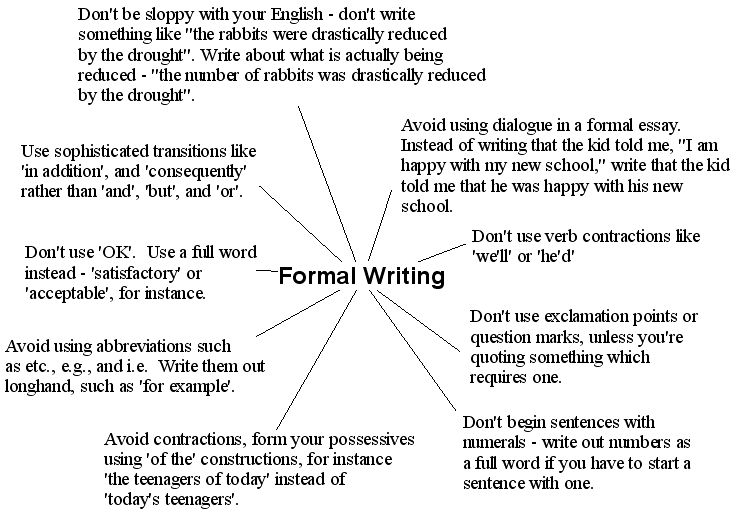First or second person in formal language
Most of the time, you shouldn’t use the first or second person in a formal piece of writing. Using ‘I’ or ‘we’ generally makes the writing seem a little too personal to be taken seriously as a formal piece. Some teachers or markers absolutely hate the use of the first person in a formal essay and will give you a horrible mark, even if the other aspects of your essay are good.
However, there are some situations when, even in a formal piece of writing, it’s OK to use the first or second person. The most common situation is when part of your essay is about some sort of personal experience. To try to write a formal essay without using ‘I’ in such a situation results in some horribly complicated sentences and makes the whole essay into a piece of junk. It is OK to use ‘I’ in this situation, providing you restrict your use of it to:
telling the reader what you saw or did,
telling the reader your reactions to what you saw or did, and
telling the reader why you reacted the way you did.
However, doing anything further using ‘I’ is unnecessary. Here’s an example of appropriate use:
In Cairo last year, I visited some of the rug factories on the outskirts of the city. In those factories, I was witness to kids as young as eight working to make rugs. Although I had known about child labour, witnessing it in person was a severe awakening to how different the world outside of Australia can be.
Now, you could try to write this using the third person, but you’d end up with something like this:
In Cairo last year, the author visited some of the rug factories on the outskirts of the city. In those factories, he was witness to kids as young as eight working to make rugs. Although the author had known about child labour, witnessing it in person was a severe awakening to how different the world outside of Australia can be.
This results in a paragraph that sounds a little bit awkward and overly formal. So in formal language a good, general rule is to not use the first person, except when there’s no easy way of writing without it, such as when you’re discussing a personal experience. However, using ‘I’ beyond this isn’t a good idea. For instance, this probably wouldn’t be appropriate as a second paragraph:
I am not sure whether there is an obvious solution to the overseas child labour problem. I feel that the sledgehammer attempts to solve the problem by refusing to import cheap child-made products have worsened the problem by driving them out of a job and into begging.
This part of the essay would be much more appropriate if written in the third person - it doesn’t need to be written in the first person like the first paragraph. A better version would be this:
There is no obvious solution to the child labour problem in foreign countries. Past attempts have involved countries refusing to import cheap-child made products, but have actually worsened the situation. Children who did have jobs have been driven out into the street to beg to support themselves and their families.
Handy Hint - General tips for formal writing
Here are some of the things you should do and not do when you’re writing formally.

Click here to move on to the next topic: Replacing the first person in formal writing